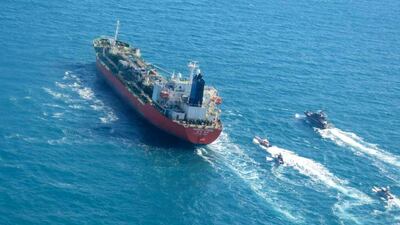Iran seized a South Korean chemical tanker in the Strait of Hormuz on Monday in the latest act of aggression against civilian maritime vessels.
Islamic Revolutionary Guard Corps gunboats led the Hankuk Chemi towards the port of Bandar Abbas after stopping the tanker in the crucial shipping lane.
Iranian media said the crew were detained. The 20 crew members are from South Korea, Indonesia, Vietnam and Myanmar.
Iran claimed the vessel was seized for polluting the Gulf with chemicals, a charge the ship's operator, DM Shipping, denies.
The US Navy's Fifth Fleet, based in Bahrain, said it was monitoring the situation.
South Korea's Yonhap news agency said Seoul had sent the anti-piracy Cheonghae Unit, established to protect vessels off the coast of Somalia, to the Gulf.
South Korea's defence ministry called for the immediate release of the vessel.
"The foreign ministry and the South Korean embassy in Iran have learnt that the crews are safe, and are requesting the early release of the ship," the ministry said.
A spokesman from the UK Foreign, Commonwealth and Development Office said: “It is vital that freedom of navigation is maintained and that trade is able to safely pass through international waters in this region.”
Maritime security company Dryad Global reported that the tanker left Saudi Arabia's terminal at Jubail and was heading for Fujairah on the UAE's east coast when an anomaly was reported.
A marine chart showed the vessel, which was carrying 7,200 tonnes of ethanol, moved along the northern UAE and Omani coasts when it stopped and turned back towards Iran.
The UK Maritime Trade Operations office in Dubai said it was aware that an "interaction occurred this morning between 6.15am and 7.33am within the Strait of Hormuz, between a merchant vessel and the Iranian authorities".
It said the vessel "made an alternation of course north and proceeded into Iranian territorial waters".
Iranian state TV later claimed the country had seized the tanker over alleged "oil pollution".
Aerial images from Iran's Tasnim news agency, apparently shot from a military helicopter, showed attack boats escorting the tanker, with Hankuk Chemi clearly visible on the stern.
Tehran's government had yet to officially comment on Monday.
South Korean banks currently hold $7 billion of Iranian funds that were frozen in accordance with US sanctions.
Iran has tried to have the cash released and a visit by South Korea's deputy foreign minister was set for this week.
On Sunday, the Pentagon said the USS Nimitz aircraft carrier would extend its stay in the Gulf after Iranian threats of retaliation on the first anniversary of the killing of Qassem Suleimani, the leader of Iran's Quds Force.
The seizure of the Hankuk Chemi is the latest incident in the Strait.
In July 2019, the British-flagged Stena Impero was seized by IRGC and held for two months in Bandar Abbas.
The incident was an act of retaliation for the seizure of an Iranian tanker off Gibraltar by British Royal Marines.
The Strait of Hormuz, a 30 kilometre-wide chokepoint between the Arabian Gulf and the Gulf of Oman, is the world's most important oil artery and used by thousands of merchant vessels each year.


